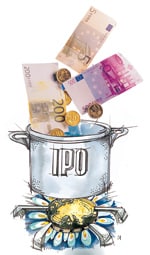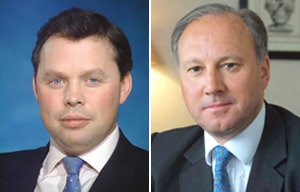The European IPO market is building up an impressive head of steam, but investors arent prepared to buy just anything.

The first quarter of this year was always expected to be a good one for European IPOs, but few dared predict that the levels of activity would rival those at the height of the recent boom. But according to figures from capital markets information provider Dealogic, a total of $8.4 billion was raised in 45 floats during the quarter. That was 19% of total equity capital markets business and the highest level since the telecom, media and technology frenzys final throes in the third quarter of 2001. Overall, equity capital market (ECM) activity in the quarter was up an impressive 157%, to $43.9 billion, on the same quarter in 2003.
So are ECM bankers breaking out the champagne? Not yet, according to Phil Shelley, executive director of ECM at UBS in London. This is certainly not a market in which anything goes, he says. Companies business models need to be demonstrably successful and sustainable.
The quarters highlight was undoubtedly Belgian fixed- and mobile-line provider Belgacom, which raised 3.3 billion, making it the largest European IPO since mobile phone company Orange floated for 9 billion in 2001. Belgacoms deal was also the worlds biggest IPO since Travelers Property Casualty in March 2002.
Goldman Sachs, Lehman Brothers, Morgan Stanley and UBS were bookrunners on the deal, which allowed the ADSB consortium, including SBC Communications and Singapore Telecom, to exit its 38.4% stake in the company. ADSB had held its stake since 1996, when the Belgian government sold shares to help Belgacom modernize.
The performance of the stock since the IPO underlines the caution of the market. Although it closed 4.78% up, at 25.67, on its debut on March 22against a fall in the benchmark DJ Stoxx telecoms sector index of 5.48%it has since slipped back, though never falling below its IPO price of 24.50.
|
Scandinavian Success |
|
To say that the Scandinavian IPO market has been moribund is to understate its lifelessness. Cosmetics company Oriflame was the first new issuer in the Swedish market for almost two years, and while the Norwegian market had seen a string of small IPOs since December, it had yet to absorb a sizeable deal until fertilizer firm Yara International was successfully spun-off from parent Norsk Hydro at the end of March.
The two dealsOriflame raised Skr5.13 billion ($673.05 million) and Yara International Nkr2.62 billion ($376.82 million)reassured investors in the region who had come to believe that the IPO market was jinxed following debacles such as centrifuge maker Alfa Laval, which traded below its issue price for many months after it floated, and Dometic, a refrigerator company, which pulled its IPO a few hours before shares were due to be listed in December.
The strong oversubscription levelsOriflame was 10 times covered, Yara almost 20 timesalso bolstered the private equity and venture capital community, which had been concerned about the lack of exits from investments due to the closed IPO market.
|
Turmoil in Europe Stymies IPO Market
The change in character of the equity markets in the weeks since the Madrid bombings on March 11 has had significant fallout for IPO candidates. The other highlight of the quarter was supposed to be Irish fixed-line provider Eircom. It completed its 809 million IPO on March 18, having priced 522 million shares at 1.55 from a range of 1.48 -1.75.
But Eircoms shares have consistently traded below issue price and by April 6 had fallen to1.37, despite a claimed 2.5 times oversubscription. Bankers cite the changed equity environmentand the increased attention paid to Eircoms high debt levels as a resultfor the stocks poor performance.
Citigroup, Deutsche Bank, Goldman Sachs and Morgan Stanley were bookrunners for the deal, which was the second time the company had been listed. It was taken private in 2001 by the Valentia consortium of Providence Equity Partners, Soros Private Equity, Goldman Sachs and former Heinz chairman and CEO Tony O’Reilly, who is now chairman of Eircom. All except OReilly have retained a small stake in Eircom following the IPO.

|
|
|
Of course, regardless of its post-IPO stock performance, Eircom executives can be justly pleased that they completed their deal. Two notable IPOs from Germanysemiconductor companies X-Fab and Siltronicwere less successful and highlighted the fragility of the market.
Both X-Fabs 161 million IPO and Siltronics 1.09 billion deal suffered as a result of the general downturn in semiconductor stocks and the poor performance of Semiconductor Manufacturing International Corporation (SMIC), which has consistently traded below issue price since its debut on the New York and Hong Kong stock exchanges on March 17.
Bankers say that the changed temperament of investors means that companies in volatile sectors such as semiconductors simply arent viable as IPO candidates. Companies seeking to IPO need to have a good equity story, credible management and good visibility of earnings going forward, says Stephen Pull, head of corporate broking at Lehman Brothers in London. He says that doesnt necessarily mean that companies need to be making a profit (neither X-Fab nor Siltronic were) but that analysts need to be able to model future earning with confidence; the trajectory of earnings has to be clear.
Investors Seek Track Record and Predictability
The outlook for IPOs is still heavily dependent on the secondary market. Were still reasonably optimistic about the secondary market based on valuations, the economic outlook and the cash on investors books, says Pull. There is pent up demand for good stories from new issuers.
Michael Lavelle, head of European ECM at Citigroup in London, says that investors want to see companies that are cash generative. Investors are focused on the more predictable companies, he says. A track record, liquidity and low earnings volatility are almost as important as valuation and the strength of management in the current market conditions.
Lehmans Pull says that since the autumn he has seen a dramatic increase in the number of inquiries about IPOs: The pipeline is strong going forward, he says. Deutsche Posts 2.5 billion spin-off of Postbank via Deutsche Bank and Morgan Stanley and the 1.75 billion privatization of French aero engine manufacturer Snecma by ABN AMRO Rothschild, Crdit Lyonnais and Credit Suisse First Boston are likely to be the highlights of the coming months.
But, as always, it will be the steady trickle of mid-size deals that will prove whether the IPO recovery is here to stay. If ECM bankers can encourage that trickle to become a flood, thenjust possiblythey may be breaking out the champagne at the end of the second quarter.
Laurence Neville



